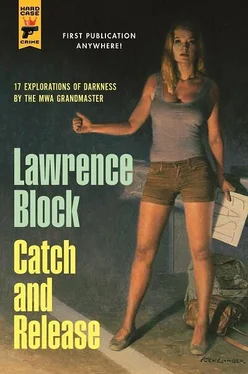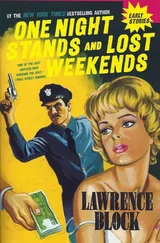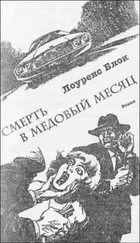“An enviable state,” the priest said. “Or is it? The man attained that state, and his greed, which no longer imprisoned him, still operated as before. It was his identity, part and parcel of his personality. He remained greedy and heartless, not out of compulsion but out of choice, out of a sense of self.” He frowned. “Unless we’re to take his final remarks cum grano salis? ” To the puzzled policeman he said, “With a grain of salt, that is to say. You translated fuck-you money for me, so at least I can return the favor. A sort of quid pro quo , which in turn means...”
“That one I know, Priest.”
“And Fielding was not stretching the truth when he said he was the same vicious bastard he’d always been,” the doctor put in. “Peace of mind didn’t seem to have mellowed him at all. Did I mention his brother?”
The men shook their heads.
“Fielding had a brother,” the doctor said, “and, when it began to appear as though this scam of his might prove profitable, Fielding put his brother to work for him. He made his brother change his name, and picked Arnold Fielding for him, having in mind the poet Matthew Arnold. The brother, whom everyone called Arnie, functioned as a sort of office manager, and was also a sort of mythical beast invoked by Byron in time of need. If, for example, an author came in to cadge an advance, or ask for something else Byron Fielding didn’t want to grant, the agent wouldn’t simply turn him down. ‘Let me ask Arnie,’ he would say, and then he’d go into the other office and twiddle his thumbs for a moment, before returning to shake his head sadly at the client. ‘Arnie says no,’ he’d report. ‘If it were up to me it’d be a different story, but Arnie says no.’”
“But he hadn’t actually consulted his brother?”
“No, of course not. Well, here’s the point. Some years after Gerald Metzner learned about Byron Fielding’s peace of mind, Arnie Fielding had a health scare and retired to Florida. He recovered, and in due course found Florida and retirement both bored him to distraction, and he came back to New York. He went to see his brother Byron and told him he had decided to go into business. And what would he do? Well, he said, there was only one business he knew, and that’s the one he would pick. He intended to set up shop on his own as a literary agent.
“‘The best of luck to you,’ Byron Fielding told him. ‘What are you going to call yourself?’
“‘The Arnold Fielding Literary Agency,’ Arnie said.
“Byron shook his head. ‘Better not,’ he said. ‘You use the Fielding name and I’ll take you to court. I’ll sue you.’
“‘You’d sue me? Your own brother?’
“‘For every cent you’ve got,’ Byron told him.”
The soldier lit his pipe. “He’d sue his own brother,” he said, “to prevent him from doing business under the name he had foisted upon him. The man may have achieved peace of mind, Doctor, but I don’t think we have to worry that it mellowed him.”
“Arnie never did open his own agency,” the doctor said. “He died a year or so after that, though not of a broken heart, but from a recurrence of the illness that had sent him into retirement initially. And the old pirate himself, Byron Fielding, only survived him by a couple of years.”
“And your young writer?”
“Not so young anymore,” said the doctor. “He had a successful career as a screenwriter, until ageism lessened his market value, at which time he returned to novel-writing. But the well-paid Hollywood work had taken its toll, and the novels he wrote all failed.”
They were considering that in companionable silence when a log burned through and fell in the fireplace. They turned at the sound, observed the shower of sparks, and heard in answer a powerful discharge of methane from the old man’s bowels.
“God, the man can fart!” cried the doctor. “Light up your pipe, Soldier. What I wouldn’t give for a cigar!”
“A cigar,” said the priest, thoughtfully.
“Sometimes it’s only a cigar,” the doctor said, “as the good Dr. Freud once told us. But in this instance it would do double duty as an air freshener. Priest, are you going to deal those cards?”
“I was just about to,” said the priest, “until you mentioned the cigar.”
“What has a cigar, and a purely hypothetical cigar at that, to do with playing a long-delayed hand of poker?”
“Nothing,” said the priest, “but it has something to do with greed. In a manner of speaking.”
“I’m greedy because I’d rather inhale the aroma of good Havana leaf than the wind from that old codger’s intestines?”
“No, no, no,” said the priest. “It’s a story, that’s all. Your mention of a cigar put me in mind of a story.”
“Tell it,” the policeman urged.
“It’s a poor story compared to those you all have told,” the priest said. “But it has to do with greed.”
“And cigars?”
“And cigars, yes. It definitely has to do with cigars.”
“Put the cards down,” the doctor said, “and tell the story.”
There was a man I used to know (said the priest) whom I’ll call Archibald O’Bannion, Archie to his intimates. He started off as a hod carrier on building sites, applied himself diligently learning his trade, and wound up with his own construction business. He was a hard worker and a good businessman, as it turned out, and he did well. He was motivated by the desire for profit, and for the accoutrements of success, but I don’t know that I would call him a greedy man. He was a hard bargainer and an intense competitor, certainly, and he liked to win. But greedy? He never struck me that way.
And he was charitable, more than generous in his contributions to the church and to other good causes. It is possible, to be sure, for a man to be at once greedy and generous, to grab with one hand while dispensing with the other. But Archie O’Bannion never struck me as a greedy man. He was a cigar smoker, and he never lit a cigar without offering them around, nor was there anything perfunctory about the offer. When he smoked a cigar, he genuinely wanted you to join him.
He treated himself well, as he could well afford to do. His home was large and imposing, his wardrobe extensive and well chosen, his table rich and varied. In all these areas, his expenditures were consistent with his income and status.
His one indulgence — he thought it an indulgence — was his cigars.
He smoked half a dozen a day, and they weren’t William Penn or Hav-a-Tampa, either. They were the finest cigars he could buy. I liked a good cigar myself in those days, though I could rarely afford one, and when Archie would offer me one of his, well, I didn’t often turn him down. He was a frequent visitor to the rectory, and I can recall no end of evenings when we sat in pleasantly idle conversation, puffing on cigars he’d provided.
Then the day came when a collection of cigars went on the auction block, and he bought them all.
A cigar smoker’s humidor is not entirely unlike an oenophile’s wine cellar, and sometimes there is even an aftermarket for its contents. Cigars don’t command the prices of rare bottles of wine, and I don’t know that they’re collected in quite the same way, but when a cigar smoker dies, the contents of his humidor are worth something, especially since Castro came into power in Cuba. With the American embargo in force, Havana cigars were suddenly unobtainable. One could always have them smuggled in through some country that continued to trade with Cuba, but that was expensive and illegal, and, people said, the post-revolution cigars were just not the same. Many of the cigar makers had fled the island nation, and the leaf did not seem to be what it was, and, well, the result was that pre-Castro cigars became intensely desirable.
Читать дальше








